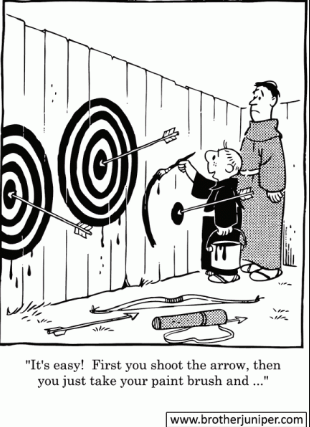How to Get Lucky in Business
Whenever I ask someone why their business has been so successful over the years, the most popular answer is “we got lucky.” It’s the same answer that I give when I am asked the same thing. We were just lucky. You know the drill. Right place, right people, right time.
What other explanation could there be? I have known many great ideas, products, and services led by good people that have failed. What could have possibly propelled my business, while simultaneously keeping others from ever getting off the ground if not luck?
When I would give someone the luck answer, it was always met equally with groans and knowing nods. No one loves that answer and to the uninitiated it’s the only answer that makes sense. But what if I told you the businesses that were successful, while they were lucky, they didn’t do it by chance. Now that’s a different conversation.
Luck is defined as, “success or failure apparently brought by chance rather than through one’s own actions.” I would like to place a strong emphasis on that word apparently.
Chance is how most people think of luck. It’s passive and just happens to some while skipping over others with no rhyme or reason. Chance isn’t something one makes happen. It’s something that occurs or doesn’t, and you have no power over it.
Successful people who have started or led many successful businesses know the truth. Luck and chance are not the same thing. While luck can never be guaranteed, it can be reinforced and nurtured. Luck can be coaxed. You can apparently have some power over luck.
Increasing Luck through Experimentation
You can’t talk about manipulating luck without talking about experimentation. Experiments are the levers you pull to increase your odds. Much like a casino slot machine, if you don’t pull the lever you’ll never get the payout.
You heard that right. Experimentation is like gambling. But in this game, even when you lose you could be a winner. Let’s take a look at some of what makes experimentation so important.
Even Failed Experiments can be Successful
Experiments aren’t always about getting it right the first time. They are about testing a theory and learning new information. When done well, experiments give you access to insights you didn’t already have. Even when they fail.
When an experiment fails, you learn something about your business, your customer, or the world around you. You walk away with greater knowledge. I can hardly call that a loss.
No One Mourns an Experiment
An experiment by definition is temporary. It’s meant to only be around for a finite amount of time until it can be evaluated. If it worked, you can double down or modify it to learn something else. If it didn’t, you can learn what you needed to and move on to the next experiment.
There is nothing sacred about an experiment. That doesn’t mean no one cares, but the difference is the outcome is what’s important and not the experiment itself. Experiments will come and go, but what we learned from them should stay with us forever.
Decisions are Riskier than Experiments
Experiments can be lower risk for a number of reasons, but the biggest is that they are merely side roads in the larger vision. They don’t fundamentally change where you are going. Perhaps over time they can over hundreds of experiments that slowly take you further away from where you started. But It’s iterative, deliberate, and based on real data.
Decisions on the other hand have weight. They set a course. They cost more to change and when they fail it’s jarring. The trust of those you lead erodes a little. It’s not that decisions are bad. Decisions are needed in any business. They’re just better when informed and backed by experimentation.
The Dangers of Experimentation
I’ve probably given the impression up till now that you can’t go wrong with experimentation. That’s intentional. I personally think the odds are against any business who neglects regular experimentation, but that doesn’t mean it can’t harm you either.
I have made many mistakes with experimentation, and, while we were resilient enough to avoid any permanent damage, it did slow us down as it took time to heal from the wounds. Let me share a few mistakes that you may want to avoid as you navigate your own experiments.
Too Many Experiments
In the early days we loved to experiment so much we had an expression among the team of “Everything Changes Monday.” It was actually energizing at first.
Kevin, my only business partner at the time, and I would go to conferences or have these long discussions on Saturday mornings where all kinds of ideas were birthed. We were so excited that we would pull the team into the conference room and announce, “Everything Changes Monday.”
The problem is that it got old quickly. It started to burn our team out, and they began to dread whenever Kevin and I were away for any period of time. It meant we were going to turn something over on it’s head.
I mention this one first because it was the most challenging to fix. It had become a part of our culture, and it’s the one that we still feel remnants of today.
It is so important to experiment with every area of your business at one point or another, but maybe not everything and not all the time. Use wisdom and give yourself and your team time to live with a few experiments for a bit.
Moving on from Experiments too Quickly
Another challenge with our “Everything Changes Monday” culture was we didn’t let experiments finish. We had new ideas we wanted to test and we were too excited and impatient to let the current ones run their course.
As you can imagine, switching experiments so quickly left lots of unfinished projects and unlearned lessons scattered about. This lack of progress on so many things caused discontentment and frustration.
Experimentation is a practice of patience. Experiments take time to prove our disprove our hypothesis, and it’s a real skill that you develop over many experiments to determine just how much time is needed before you can call it quits.
Some experiments can last a long time. We are currently running an experiment that we think requires 14 months to answer our questions, and we’re just now on the home stretch. It’s answered some questions already, but the final answers are the most important. We have to be patient.
Don’t give up too soon, or you may end up making an incorrect judgment about just how effective an experiment really was. Which brings us to our next danger.
Moving on from Experiments too Slowly
Every experiment has a window or period of time when it’s best to wrap it up. If moving too quickly means you misjudge the experiment altogether, then moving too slowly means you forget it’s an experiment at all.
The longer an experiment runs, the less it feels like an experiment and the more it feels like a decision. Everyone gets used to living with the experiment. Everyone forgets the question they were trying to answer. We lose our hypothesis, and, worst of all, people become attached to the experiment as a solution.
When your team makes the transition from experiment to solution, that’s what I call a common-law decision, and, to be honest, sometimes that’s the result you want. If an experiment goes well, the right thing to do very well may be to make it permanent.
The danger of common-law decisions, those experiments that just never end, is when they aren’t purposely left alone. They continue because you stopped watching. Because you stopped caring. Because you lost sight of what was really important. When that happens, you end up with a bunch of decisions you didn’t even know you were making. And those are the worst decisions.
Aimless Experimentation
Over the years I have ran hundreds of experiments on every area of my businesses. It’s exciting to see the kind of impact you can have by making little tweaks over time. But the danger is experimenting merely for experimentation’s sake.
Experimentation needs to have a hypothesis you’re attempting to prove or a question you’re trying to answer. Without that your evaluations of the results are clouded, and you end up like my friend Brother Juniper.

Proper experimentation is not about throwing everything up on the wall and seeing what sticks. It’s about carefully picking an area of the business that you think can be better and carefully crafting some theories. Then you methodically test those theories.
Not Considering the Cost of an Experiment
Experiments aren’t free. They can come at much lower costs than decisions, but there is still cost nonetheless. And here’s the crazy thing, if you aren’t careful an experiment can come with a much larger price tag than you anticipated.
Take an example pricing experiment. Raising your prices by 20% isn’t very risky. In fact most of you reading this likely should try that experiment right now. Raising your prices by 100% is very risky. Sure you can lose 50% of your customers and still break even, but how confident are you that your market can bear it? Or that your product or service can demand it over your competition?
That was just a simple experimentation with pricing, which is really a lot less risky than many of the experiments you will try over the life of your business. You have to really weigh each experiment and consider it’s impact.
How to do Experimentation Better
Up until now we’ve looked at why experimentation is important and some of the dangers you should look out for. Now I’d like to dive into the approach I use to run experiments. You may recognize it as the very familiar scientific method.
- Make an observation. Experiments are birthed from observations you are making daily about your own business. Do you see an area of your business that you think could be improved?
- Ask a question. Why is this area of your business not as good as it could be?
- Form a hypothesis, or testable explanation. Make a guess at what might possibly be the issue. Trust your gut here, but remember the dangers we mentioned above.
- Make a prediction based on the hypothesis. You’ve taken a guess at the issue, now make a prediction of what you expect the outcome to be if you make the change.
- Test the prediction. Run the experiment based on the parameters you should have defined in the previous steps. The what, how, and how long.
- Iterate: use the results to make new hypotheses or predictions. Rinse and repeat as much as you need to in order to be confident in the results.
Luck finds those who endure and engage
If luck is about being in the right place at the right time with the right people, then experimentation always gives you better odds.
Businesses that experiment by putting themselves out there more often will always be luckier than those that don’t. They are more likely to be in the right places.
The businesses that can find purpose in the journey, passion for the work, and progress through the experiments are bound to endure longer. They have a far greater chance of being around at the right time.
Businesses that reach out beyond themselves, engaging with the world around them, will have far more chances at meeting the right people.
Luck can never be guaranteed, but if you are willing to create a healthy relationship with experimentation, you can absolutely increase your chances.

